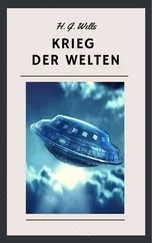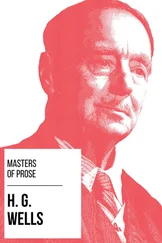H. Wells - H. G. Wells - Six Novels
Здесь есть возможность читать онлайн «H. Wells - H. G. Wells - Six Novels» — ознакомительный отрывок электронной книги совершенно бесплатно, а после прочтения отрывка купить полную версию. В некоторых случаях можно слушать аудио, скачать через торрент в формате fb2 и присутствует краткое содержание. Жанр: unrecognised, на немецком языке. Описание произведения, (предисловие) а так же отзывы посетителей доступны на портале библиотеки ЛибКат.
- Название:H. G. Wells: Six Novels
- Автор:
- Жанр:
- Год:неизвестен
- ISBN:нет данных
- Рейтинг книги:3 / 5. Голосов: 1
-
Избранное:Добавить в избранное
- Отзывы:
-
Ваша оценка:
- 60
- 1
- 2
- 3
- 4
- 5
H. G. Wells: Six Novels: краткое содержание, описание и аннотация
Предлагаем к чтению аннотацию, описание, краткое содержание или предисловие (зависит от того, что написал сам автор книги «H. G. Wells: Six Novels»). Если вы не нашли необходимую информацию о книге — напишите в комментариях, мы постараемся отыскать её.
H. G. Wells: Six Novels — читать онлайн ознакомительный отрывок
Ниже представлен текст книги, разбитый по страницам. Система сохранения места последней прочитанной страницы, позволяет с удобством читать онлайн бесплатно книгу «H. G. Wells: Six Novels», без необходимости каждый раз заново искать на чём Вы остановились. Поставьте закладку, и сможете в любой момент перейти на страницу, на которой закончили чтение.
Интервал:
Закладка:
“Walk by me,” said I, nerving myself; and side by side we walked down the narrow way, taking little heed of the dim Things that peered at us out of the huts.
None about the fire attempted to salute me. Most of them disregarded me, ostentatiously. I looked round for the Hyena-swine, but he was not there. Altogether, perhaps twenty of the Beast Folk squatted, staring into the fire or talking to one another.
“He is dead, he is dead! the Master is dead!” said the voice of the Ape-man to the right of me. “The House of Pain—there is no House of Pain!”
“He is not dead,” said I, in a loud voice. “Even now he watches us!”
This startled them. Twenty pairs of eyes regarded me.
“The House of Pain is gone,” said I. “It will come again. The Master you cannot see; yet even now he listens among you.”
“True, true!” said the Dog-man.
They were staggered at my assurance. An animal may be ferocious and cunning enough, but it takes a real man to tell a lie.
“The Man with the Bandaged Arm speaks a strange thing,” said one of the Beast Folk.
“I tell you it is so,” I said. “The Master and the House of Pain will come again. Woe be to him who breaks the Law!”
They looked curiously at one another. With an affectation of indifference I began to chop idly at the ground in front of me with my hatchet. They looked, I noticed, at the deep cuts I made in the turf.
Then the Satyr raised a doubt. I answered him. Then one of the dappled things objected, and an animated discussion sprang up round the fire. Every moment I began to feel more convinced of my present security. I talked now without the catching in my breath, due to the intensity of my excitement, that had troubled me at first. In the course of about an hour I had really convinced several of the Beast Folk of the truth of my assertions, and talked most of the others into a dubious state. I kept a sharp eye for my enemy the Hyena-swine, but he never appeared. Every now and then a suspicious movement would startle me, but my confidence grew rapidly. Then as the moon crept down from the zenith, one by one the listeners began to yawn (showing the oddest teeth in the light of the sinking fire), and first one and then another retired towards the dens in the ravine; and I, dreading the silence and darkness, went with them, knowing I was safer with several of them than with one alone.
In this manner began the longer part of my sojourn upon this Island of Doctor Moreau. But from that night until the end came, there was but one thing happened to tell save a series of innumerable small unpleasant details and the fretting of an incessant uneasiness. So that I prefer to make no chronicle for that gap of time, to tell only one cardinal incident of the ten months I spent as an intimate of these half-humanised brutes. There is much that sticks in my memory that I could write,—things that I would cheerfully give my right hand to forget; but they do not help the telling of the story.
In the retrospect it is strange to remember how soon I fell in with these monsters' ways, and gained my confidence again. I had my quarrels with them of course, and could show some of their teeth-marks still; but they soon gained a wholesome respect for my trick of throwing stones and for the bite of my hatchet. And my Saint-Bernard-man's loyalty was of infinite service to me. I found their simple scale of honour was based mainly on the capacity for inflicting trenchant wounds. Indeed, I may say—without vanity, I hope—that I held something like pre-eminence among them. One or two, whom in a rare access of high spirits I had scarred rather badly, bore me a grudge; but it vented itself chiefly behind my back, and at a safe distance from my missiles, in grimaces.
The Hyena-swine avoided me, and I was always on the alert for him. My inseparable Dog-man hated and dreaded him intensely. I really believe that was at the root of the brute's attachment to me. It was soon evident to me that the former monster had tasted blood, and gone the way of the Leopard-man. He formed a lair somewhere in the forest, and became solitary. Once I tried to induce the Beast Folk to hunt him, but I lacked the authority to make them co-operate for one end. Again and again I tried to approach his den and come upon him unaware; but always he was too acute for me, and saw or winded me and got away. He too made every forest pathway dangerous to me and my ally with his lurking ambuscades. The Dog-man scarcely dared to leave my side.
In the first month or so the Beast Folk, compared with their latter condition, were human enough, and for one or two besides my canine friend I even conceived a friendly tolerance. The little pink sloth-creature displayed an odd affection for me, and took to following me about. The Monkey-man bored me, however; he assumed, on the strength of his five digits, that he was my equal, and was for ever jabbering at me,—jabbering the most arrant nonsense. One thing about him entertained me a little: he had a fantastic trick of coining new words. He had an idea, I believe, that to gabble about names that meant nothing was the proper use of speech. He called it “Big Thinks” to distinguish it from “Little Thinks,” the sane every-day interests of life. If ever I made a remark he did not understand, he would praise it very much, ask me to say it again, learn it by heart, and go off repeating it, with a word wrong here or there, to all the milder of the Beast People. He thought nothing of what was plain and comprehensible. I invented some very curious “Big Thinks” for his especial use. I think now that he was the silliest creature I ever met; he had developed in the most wonderful way the distinctive silliness of man without losing one jot of the natural folly of a monkey.
This, I say, was in the earlier weeks of my solitude among these brutes. During that time they respected the usage established by the Law, and behaved with general decorum. Once I found another rabbit torn to pieces,—by the Hyena-swine, I am assured,—but that was all. It was about May when I first distinctly perceived a growing difference in their speech and carriage, a growing coarseness of articulation, a growing disinclination to talk. My Monkey-man's jabber multiplied in volume but grew less and less comprehensible, more and more simian. Some of the others seemed altogether slipping their hold upon speech, though they still understood what I said to them at that time. (Can you imagine language, once clear-cut and exact, softening and guttering, losing shape and import, becoming mere lumps of sound again?) And they walked erect with an increasing difficulty. Though they evidently felt ashamed of themselves, every now and then I would come upon one or another running on toes and finger-tips, and quite unable to recover the vertical attitude. They held things more clumsily; drinking by suction, feeding by gnawing, grew commoner every day. I realised more keenly than ever what Moreau had told me about the “stubborn beast-flesh.” They were reverting, and reverting very rapidly.
Some of them—the pioneers in this, I noticed with some surprise, were all females—began to disregard the injunction of decency, deliberately for the most part. Others even attempted public outrages upon the institution of monogamy. The tradition of the Law was clearly losing its force. I cannot pursue this disagreeable subject.
My Dog-man imperceptibly slipped back to the dog again; day by day he became dumb, quadrupedal, hairy. I scarcely noticed the transition from the companion on my right hand to the lurching dog at my side.
As the carelessness and disorganisation increased from day to day, the lane of dwelling places, at no time very sweet, became so loathsome that I left it, and going across the island made myself a hovel of boughs amid the black ruins of Moreau's enclosure. Some memory of pain, I found, still made that place the safest from the Beast Folk.
Читать дальшеИнтервал:
Закладка:
Похожие книги на «H. G. Wells: Six Novels»
Представляем Вашему вниманию похожие книги на «H. G. Wells: Six Novels» списком для выбора. Мы отобрали схожую по названию и смыслу литературу в надежде предоставить читателям больше вариантов отыскать новые, интересные, ещё непрочитанные произведения.
Обсуждение, отзывы о книге «H. G. Wells: Six Novels» и просто собственные мнения читателей. Оставьте ваши комментарии, напишите, что Вы думаете о произведении, его смысле или главных героях. Укажите что конкретно понравилось, а что нет, и почему Вы так считаете.












